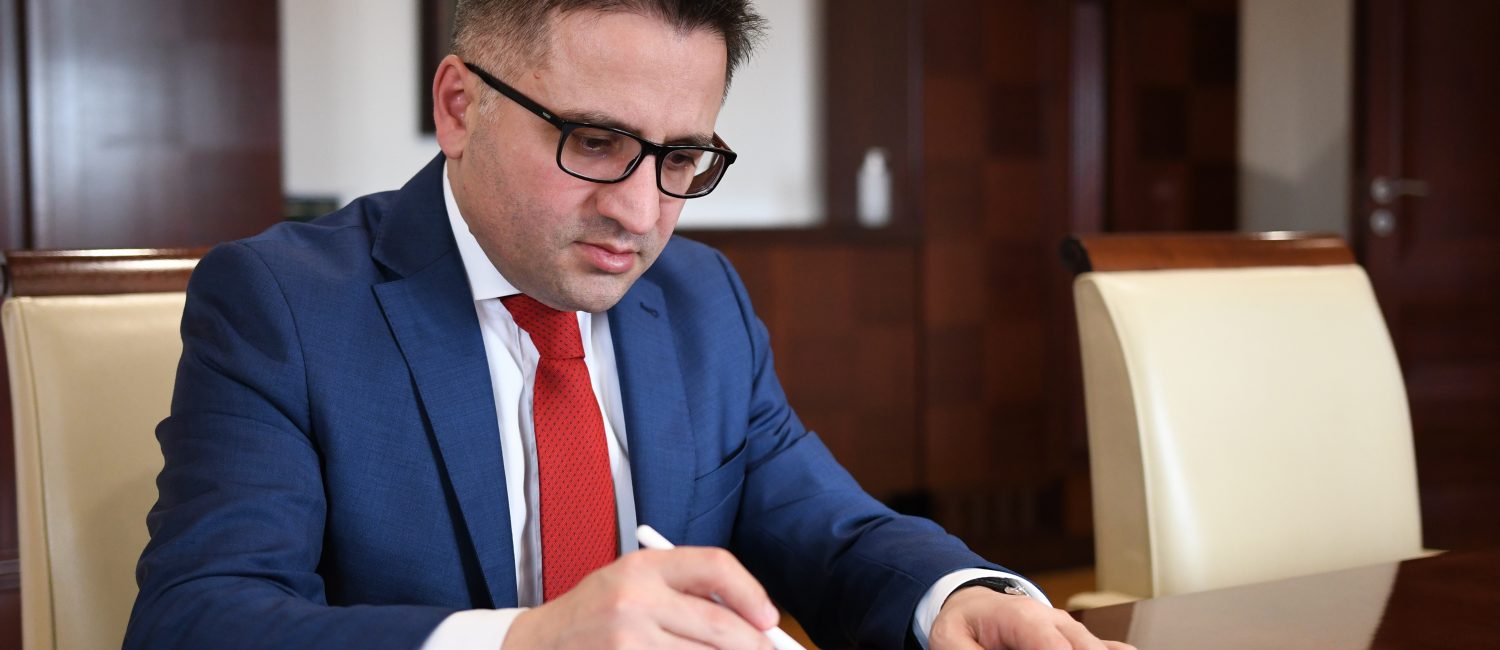25th March 2023, Skopje – As Nobel Prize winner, Joseph Stiglitz, says “Development is about transforming the lives of people, not just transforming economies”. “The ultimate resource in economic development is people. It is people, not capital or raw materials that develop the economy”, Peter Drucker, the father of management, said. Wellbeing of people depends on the economy and the economy depends on what people bring as an input.
Whenever there is an adequate systemic solution in the economy and the society in general, it delivers results. Good example thereof is the recent increase of the minimum wage, in line with the established system for meeting the basic needs, i.e. adjusting it taking into account the costs of living, and the results, i.e. the average wage. System improvement and acceleration of economic development require systemic changes – structural changes to boost productivity and competitiveness of our economy and yield better economic results. As I have indicated, people are the ultimate resource in economic development, and investing in them is an essential part of building the system that will deliver better economic results and higher living standard. I have already written about the impact of productivity on accelerated economic growth and wage increase. I dedicate this column in particular to what can be a driving force behind productivity – human capital.
Human capital is stock of knowledge, skills and other personal characteristics helping people be more productive. Pursuing formal education (early childhood, formal school system, skill building programmes), but also informal education (on-the-job learning and work experience), all represent investment in human capital. Other two pillars which building human capital is based on are access to health care and social care and inclusion.
Human Capital Theory
When analyzing the human capital theory, several classifications exist, starting with Becker, whose standpoint is that human capital increases worker’s productivity in all tasks, though differently in different tasks, organizations and situations. He views human capital as unidimensional input in the production function. Gardner, on the other hand, believes the opposite. There are many dimensions or types of skills, whereby a simple version of this approach would emphasize mental vs. physical abilities. Schultz/Nelson-Phelps view human capital as the capacity to adapt. According to this approach, human capital is useful in dealing with situations in which there is a changing environment and workers have to adapt to this. Bowles and Gintis view the human capital as the capacity to work in an organization, obey orders, while the main role of schools is to install in individuals the ideology and approach towards life. Spence defines human capital as abilities independently useful in the production process. Despite their differences, what is common for all of them is that human capital is useful in the production process and firms’ profits, therefore it is valued in the market.
From a macroeconomic point of view, human capital is the essential force for boosting economic growth and development, since people are drivers of other factors of production, such as physical capital and infrastructure. Number of papers analyze and determine the correlation between population’s education, the level of productivity and the level of economic development. As productivity increases, the economy can produce and consume more goods and services within a same timeframe, thus encouraging economic growth. Therefore, countries become richer as more human capital accumulates. This is also reflected by the World Bank Human Capital Index, according to which, most developed countries have the highest human capital index, i.e. these economies invest the most in people and accordingly have the highest level of usage of the potential labour productivity.
Investing in Human Capital is a Wise Investment
Numerous analyses, studies of the international organizations quantify the impact of the human capital development polices on the economic growth and the living standard of the citizens, indicating the link between acquiring knowledge and skills and the economic results. For instance, analyses of the human capital development policies of the Organization for Economic Cooperation and Development (OECD) in the member countries show that attending pre-school education can increase GDP per capita up to 5.5%, higher teacher-to-student ratio would contribute to growth of GDP per capita up to 3.3%, while the autonomy of universities and schools can bring about increased GDP per capita up to 3%. Other studies have shown that every additional year of schooling increases the earnings by 9% annually, with such growth rate remaining stable throughout life. Anyhow, these percentages for the developing countries are even higher, in particular at women.
Sustainability and inclusiveness of the development depend on the distribution of human capital among the population. For example, if only few possess the necessary skills to use new technologies, the economy as a whole may face constrains to boost the growth when adopting these technologies. Fairness and inclusion as regards the distribution of the human capital among the population is not just a matter of ethics, it is rather the crucial economic choice.
Investing in human capital is one of the wisest investments in boosting economic and social wellbeing of the citizens. Still, building human capital is a time- and resource-consuming process and, in return, this process yields results with higher income and volume of productivity.
Inadequately Skilled Labour Force is a Major Challenge for the Economy
In just a decade, poverty rate in the country has dropped by half, while extreme poverty rate experienced three-fold decline. Unemployment rate in 2022 dropped to 14.4% from 30.6%, as was the case ten years ago. Youth unemployment rate (aged 15-24) also declined, however, it still remains high – 32.5% out of the total number of unemployed. Aging of the population (one out of three citizens is expected to be over 60 years old by 2025) and emigration pose additional challenges to productivity. Taking the low birth rate into account, outflow of even small number of skilled workers has a negative effect on the overall pool of skills in the economy.
According to the study the World Bank conducted in 2017, most of the companies ranked the inadequately skilled labour force as one of the biggest constraints to the business environment. Strengthening workers’ skills and productivity is of key importance for improving their ability to support the older population and reducing the pressure of emigration, especially among the young people. Gender, ethnic and geographic inequality also have an adverse effect on labour market performance.
Increased quality of the human capital will be crucial for both a more sustainable and more inclusive economic growth and development of the Republic of North Macedonia, as well as managing the new challenges related to productivity, labour market inclusion and aging of the population. In the past decade, quality of human capital in the Republic of North Macedonia improved, in line with the World Bank Human Capital Index, however, it still remains relatively low – 0.56. This means that a child born today in North Macedonia will use only 56% of his/her potential productivity when he/she grows up. For comparison purposes, a child born in the developed countries will be 80% as productive, while the EU average is 0.75 or 75% of the potential productivity.
Human Capital Development Strategy 2030
Taking all the above-mentioned into consideration, the Government, in cooperation with the World Bank, has prepared Human Capital Development Strategy 2030, focusing on three key and mutually related areas – education, health and social protection, which will help the Republic of North Macedonia to strengthen and improve the human capital for inclusive development. The activities are based on four strategic pillars: 1. improved quality of services; 2. greater focus on the needs of the vulnerable categories; 3. ore funds for the education, the health and the social protection and more efficient spending and 4. strengthened resilience capacity of education, health and social care sectors applying the COVID-19 experience.
Human capital development agenda involves several government institutions, i.e. Ministry of Finance, closely coordinating with several other ministries, such as the Ministry of Education and Science, the Ministry of Health and the Ministry of Labour and Social Policy. Still, it is worth mentioning that the success of the Strategy depends on a much broader engagement of the institutions and the stakeholders, including the participation of the civil society and the private sector.
Holistic Approach to Education for Best Performance
Although when investing in human capital, healthcare and social protection are also taken into account, the human capital definition primarily pertains to education, more precisely building knowledge and skills. As a professor by vocation, the discussion about the education system in our country, as well as the quantity in support of the quality as regards the learning process, has always been a sensitive topic for me. In fact, although by the age of 18, our students attend 11 years of pre-school, primary and secondary education, the quality of learning they gain is equivalent to 7.3 years of schooling, with almost 4 years wasted in school. Attending school does not, by itself, mean learning, while high-quality teaching practice is of crucial importance for both the holistic development of students and their learning. The greatest potential lies in improving the quality of learning, rather than just simply increasing the length of schooling.
Actions will be taken to improve the quality of education by putting adequate evaluation system in place, such as the National Evaluation Framework, a new draft-concept for secondary school graduation, followed by a comprehensive reform in the field of primary education through digitization, development of curricula focused on the students’ needs and interdisciplinary access to studying, as well as investments in secondary vocational education and mandatory workplace learning. Some of the major reform processes include development of new funding formulas starting from pre-school up to a higher education level, including a merit-based system, i.e. elements of performance-based reward.
Expertise and quality of the teaching staff is equally important in this process, i.e. investment in improving their performance is of crucial importance. As for the measures under the Human Capital Development Strategy, the focus is also placed on inclusiveness in the formal education, in particular the vulnerable categories.
How Can We Reduce the Brain Drain and the Outflow of the Young Population from the Country?
What is equally important is keeping our highly skilled staff in the country. Over the past few decades, the brain drain and the outflow of young people, has been a great challenge not only in our country but also in the entire region. Thus, for instance, according to the World Bank statistics, as much as 50% of the population emigrates from Bosnia and Herzegovina, 40% from Albania, whereby as for North Macedonia, even one third of the university-educated population lives abroad. These figures are alarming. Outflow of the educated and highly-skilled staff is a considerable fiscal burden for the countries, since although investments were made therein, they currently do not participate in the productivity and the Gross Domestic Product creation.
No instant solution exists for this decade-long issue, however, there are policies, which implementation might contribute to its resolution in the long run. Developing the private sector and creating better-paying jobs, accompanied by public sector reforms that will provide for supporting the development of the private sector, is part of both these policies and the respective solution, as is increasing the productivity of highly skilled job positions, most of which belong to the public sector as well.
Expansion and promotion of tertiary education and post-graduate studies could also yield good results in resolving the issue related to the outflow of highly skilled staff, although some people believe that this could further encourage the outflow. Croatia and Romania are good examples, where the continuous promotion of tertiary education contributed to retaining the highly skilled staff in their countries.
Gender equality also plays crucial role when pursing these policies. In fact, giving more opportunities to women, who are often marginalized in society, could lead to retaining the highly skilled staff.
Improving connectivity and networking is the proper manner of taking advantage of the diaspora, in terms of generating economic benefits for the country. In addition to the remittances from abroad, emigrants may have a major impact on the domestic economy through investments and transfer of high technologies.
Tax incentives and benefits are among the policies that could provide for bringing the highly skilled staff back home. Given that their return to the country would be a factor in underpinning the economic development, in particular when they bring capital and knowledge, some of the countries apply this method of encouraging their return. However, the most efficient long-term approach in preventing the “brain drain” from the country is to prevent it from happening, i.e. to give them a good reason to stay, such as better jobs, more opportunities and a higher living standard.
Systemic Wage Rise, Monitoring the Productivity and Increasing the Living Standard
Providing our citizens with a higher living standard and a better quality of life is the top priority of this Government. Wages unquestionably play significant role in attaining these goals. Over the past 6 years, the Government has increased the minimum wage by 100% (124% in the leather, textile and clothing manufacture industries). Accordingly, the average wage surged by more than 50% during this period. In addition, pensions and benefits for the vulnerable categories are being increased (our country was the first in the region to introduce a guaranteed minimum income).
As per the State Statistical Office, GDP grew by 2.1% in 2022. Based upon the data from the census carried out in 2021, GDP per capita, in 2022, would amount to approximately EUR 7,500, or by 50% more compared to the past 6 years. This demonstrates that the wage growth accompanied the economic growth in the country, speaking in favor of our continuous commitment to boosting the productivity and improving the living standard, which would be economically viable approach for the public sector wages as well.
As I repeatedly point out, structural changes are needed, being implemented in order to accelerate the economic growth by twice and deliver higher wages, thus increasing the living standard of the citizens. Construction expansion we launched is exactly focused thereon – creating new values in the economy, providing new business deals for our companies, creating new jobs, thereby also encouraging development of several economic branches such as transport, trade and tourism. Creating new types of financial instruments, which are to mobilize the capital into new investments (in line with the Growth Acceleration Plan) is also aimed thereto. Encouraging the entry of foreign capital into the country is also significant, not only from the aspect of investments, but also in terms of bringing new technologies and knowledge. Supporting the innovation and competitiveness of domestic companies is extremely important – they are the ones who create the new value in the economy. Finally, we get back to investing in human capital, since it is the driving force of all matters mentioned above. The quality of life depends on ourselves, as well as on our personal input in the economy. I believe in fair remuneration and a fair return on the investment in the economy, whereby I stand for higher wages for all employees and providing EU-alike living conditions in our country (this implies higher productivity, as well as boosted competitiveness and greater profitability of the economy). Adequate strategy has also been put in place, being implemented, and I am pleased that despite the overlapping crisis affecting the world and our economy, positive trends have been recorded to that end. From my perspective, the long-term results will not be excluded, and we will be able to further discuss and analyze them.
“Europe at Home” for Favourable Prospects and Higher Living Standard
”The pursuit of a better life and happiness”, is the most common answer you will get from those who have left the country or those willing to build their future outside the country. (The wage is not always the only reason therefor.) When observed from the personal perspective of those opting for such a step, it is a completely rational and justified observation, particularly when we know that this is exactly what the globalization and the liberalization promote – freedom of movement of people (and labor), goods, services, capital and knowledge. European Union is also based upon these freedoms. However, as for this global race for resources, we also need to have a well-set strategy and agenda in place, all to the end of sustaining the growth factors, which provide for our country’s development. As regards the youth population
and the highly educated staff, the following should be undertaken: 1) ensuring favourable prospects, 2) opening new opportunities, 3) improving the quality of life, 4) boosting the confidence in the institutions and 5) strengthening the sense of affiliation through greater involvement in the significant processes in society.
I personally believe that that the “Europe at Home” concept incorporates all indicated reasons for retaining the young people and highly-skilled staff in our country. All this will be attained when accessing the European Union, whereby the launched negotiations provide for opening up new opportunities, while the full-fledged membership will lead to creating completely equal opportunities for development and favourable prospects like those in the EU. Bringing the EU Standards will provide for improving the quality of life and creating plenty of opportunities in our country!
















